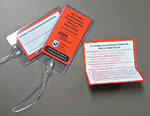Drinking Water Security
You will need Adobe Reader to view some of the files on this page. See EPA's PDF page to learn more about PDF, and for a link to the free Acrobat Reader.
This page provides links to non-EPA web sites that provide additional information about Drinking Water Security. You will leave the EPA.gov domain and enter another page with more information. EPA cannot attest to the accuracy of information on that non-EPA page. Providing links to a non-EPA Web site is not an endorsement of the other site or the information it contains by EPA or any of its employees. Also, be aware that the privacy protection provided on the EPA.gov domain (see Privacy and Security Notice) may not be available at the external link. Exit
Protecting Drinking Water
The September 11 terrorist attack on our country and anthrax incidents that followed have made us much more aware and appreciative of the basic services that Americans rely on every day, including necessities such as safe drinking water. To help the region’s public water suppliers better protect their supplies from terrorism and other hazards (ie: natural disasters), EPA has been working on tools and training specific to the water sector.
- Workshops & Tabletop Exercises
- Small Systems
- Law Enforcement
- First Responders
- Citizens & Local Emergency Planners
- Mutual Aid and Assistance
- Water/Wastewater Agency Response Network, AWWA
- Drinking Water and Wastewater Resilience
Workshops & Tabletop Exercises
EPA New England and the New England state drinking water programs have worked with New England Water Works Association (NEWWA) to conduct one-day workshops and tabletop exercises across the region. These community-based workshops are designed with water utilities as the target audience, but provide opportunities for all the other local emergency and first responders to interact and discuss all-hazards approaches to emergency preparedness and response. The workshops provide access to water security experts and use tabletop exercise scenarios and materials available from EPA. For more information on these workshops or to schedule one in your community, please contact the state drinking water security contacts.
Small Systems
To assist small public water suppliers with security and emergency planning, EPA's New England Office developed a Top Ten List for Small Ground Water Suppliers (PDF) (1 pg, 68 K). This product was distributed to water suppliers across New England and includes tips to help suppliers protect their facilities from tampering or contamination incidents, and to prepare for potential emergencies.
Law Enforcement
Drinking water security relies on many different people working together. For this reason, it is important to help educate the law enforcement community about the drinking water industry. EPA New England developed information to help the drinking water industry work together with law enforcement so that in the event of an emergency, the two groups will respond effectively together and the following is currently available:
A top ten list addressing water supply emergency preparedness and security for law enforcement professionals visor card (PDF) (2 pp, 32 K) and poster (PDF) (2 pp, 82K)
And, a citizens brochure (PDF) (2 pp, 516 K) to educate people who live near public water systems, telling them what to watch for and who to report anything suspicious to.
A new tool, a law enforcement and water-sector security training workbook and CD set, was developed to increase the awareness of law enforcement personnel to some of the threats and other security issues surrounding public drinking water supplies and wastewater facilities and to help facilitate integration and coordination at the local level. The short training modules allow for a very flexible training schedule. For more information on this tool contact: Maureen McClelland (mcclelland.maureen@epa.gov)
Citizens & Local Emergency Planners
Everyone in the community has a role in protecting their drinking water sources and infrastructure. EPA New England created tools for both neighboring citizens and for people working in the Local Emergency Planning Commissions (LEPCs) to educate them on what to be alert for in the area of water security.
- Citizens' brochure (PDF) (2 pp, 516 K)
- Top Ten Tips (Luggage Tag) for LEPCs/Emergency Responders (PDF) (2 pp, 56 K)
Additional Sources of Information
- Top Ten List for Small Ground Water Suppliers (PDF) (1 pg, 68 K)
- Top Ten List for Law Enforcement (PDF) (1 pg, 82 K)
- Citizens Brochure: Water Watchers - Helping to Protect your Local Water System (PDF) (2 pp, 516 K)
- Water System Telephone Threat Identification Checklist (PDF) (1 pg, 162 K)
- New England Water Works
- Water Information Sharing Analysis Center
- Top Ten List Pandemic & Natural Disasters Notebook (PDF) (26 pp, 88 K)
- EPA Natural Disasters and Weather Emergencies
- State Drinking Water Security Contacts

